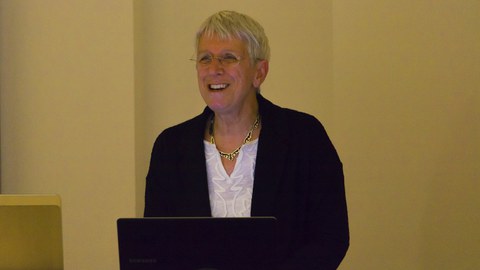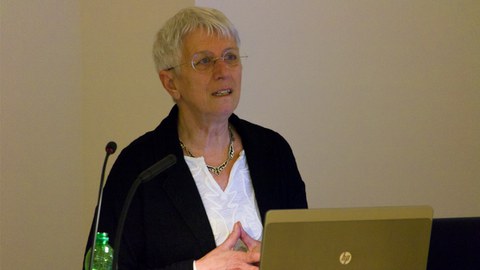29.02.2016
GenderPartnerSCHAFFTBrücken – Interview "Feminism is for Everybody, not just Women"
On February 2, Prof. Giovanna Covi gave the final lecture in the “Gender³ reloaded” project. She talked about “Audre Lorde (1934-1992): an American writer in Italian and German reception.” Giovanna Covi is associate professor of Anglo-American Language and Literatures and Gender Studies at the University of Trento. We spoke with her about feminism, gender studies, and women writers.
Welcome to Dresden and the TU. Is it your first time in Germany and in Dresden?
It is my first time in Dresden, and I hope it won’t be the last time. For the very little I have seen this morning, I love it. It’s stunning. The facilities are gorgeous. And I hope that I can come back.
Your research foci are gender studies, Anglo-American literature, and critical theory. Why do you work on these topics? What’s so fascinating about them?
I was studying in the 1970s, and American Literature was the subject I had chosen to graduate in. Those were years when society was changing very fast and very dramatically, especially for women. Women were entering into the public sphere. It became very important for me to focus on women writers. And I began to understand that every piece of knowledge is better if it is articulated by plural voices instead of being articulated by just one voice that is assumed to be universal, but in reality isn’t. So I focused my work as a student on Sylvia Plath, and I thought that there was so much work to do that somebody had to do it, and I didn’t find the time to also focus on male writers. It is not an ideological positioning, but we were so behind that first we had to fill the enormous blank about women voices left in our culture. This is not work that can be accomplished overnight, so I also concentrated my PhD on women writers. I was interested at that time – now moving into the 80s – on what we used to call postmodernism, which started my interest in theory. And of course, every time you put things together, they become more interesting, because post-structural theory became infinitely more interesting for me when it was juxtaposed or put beside feminist theory. It was a vital dialogue. They kept interrupting each other, but they also created a new discourse that was the combination of both.
So what I tried to do as I was shaping my research commitments was following what Adrienne Rich had taught me to do: never rest on the given, never settle and think you have found your promised land, never believe that you are inhabiting a single comfortable ideology from which to speak the truth to power. There is no single “truth” I can believe in that interests me; asking questions is much more rewarding. And it is better if you position your questions without resting on a given ground, but rather by juggling numerous possibilities and seeking the dialogue among them. That’s how gender studies came together with critical theory to enrich my work in US literature, as an indissoluble coalition devoted to making sense of being in the world.

Prof. Giovanna Covi gave the final lecture in the “Gender³ reloaded” project.
Why do you combine Anglo-American literature and Gender Studies?
On the one hand, to uncover and give the same visibility to women writers and thinkers that are there, have always been there, and have just not been given the attention that they deserved. On the other hand, also to work on what we might call thinking differently, because when you think from a perspective that accepts its own difference, you start thinking in a dialogical voice. This is what allows you to say, “Okay, I’m looking at literature as a woman reader.” Accepting this limitation is better for me than the delusion that anybody can speak as a universal voice. I prefer dialogue to solitude Before my generation, this dialogical perspective had not come into literature in general. And I find it most fruitful.
My research is focused on women writers, on African-American women writers. I’m interested in critical theory of gender as much as critical theory of race, and the two must come together when the woman writer is black and, to complicate the picture even further, I soon realized that one cannot adequately study African-American literature without connecting it to African-Caribbean literature, because the diaspora is the same within its difference. So it was the material of my research that forced me to cross the national boundaries of the USA
Why are you interested in women writers?
Because in the 1970s I was a feminist, and I still consider myself a feminist, without apologies. I know it is an obsolete word, I know the new generation thinks that it is a thing of the past, but yet again I see a lot of work that still needs to be done. I believe with bell hooks that feminism is for everybody, not just women, and I believe that feminism is here to stay only in so far as it is still needed. Unfortunately there is still a lot of feminist work to do, especially with men nowadays still killing women within families and “love” relationships. So the job of feminism is not finished. When it will, I will be the first one to party and rejoice and lift a glass of champagne to the demise of, feminism, alas!
For me, a plus about feminism is that it is an “-ism” without a founding book; there is no bible for feminism. There have always been different groups of feminists, often fighting against each other, not agreeing about what feminism is. There are feminisms in the plural. The second plus about feminism is what I have mentioned above: its goal is to end. It doesn’t have a fixed picture for its utopia other than its being a place where there is no sexism. It only tells you, “When I’m no longer needed, I will step back.” And that’s why I like it.
Why did you become a feminist?
Because there was no justice for women when I became a woman. When I became a woman in Italy, there was still a law that was called “delitto d'onore” (abolished only in 1981), which meant that if you were a woman and you were raped, in front of the law you were not the subject yourself, because as a woman you did not exist independently. The offense was not against you as a person or as a body but only against the male citizen who possessed you: either your father or your husband. So the crime was against their male honor not against the woman.
What are recent research projects you have been working on?
I’m trying to understand, with the help of some other scholars in Europe and the US, how we can culturally counter the intolerance about sexism and racism and how concepts travel. How they can be translated from one context into the other. I’m particularly interested, for example, in understanding how we can build a critical discourse on race in Europe today. Europe is paralyzed and scared by immigration and refugees. We can do this by drawing critically from the longer experience of racial critical thinking that has been developed in the US; there racism against dark-skinned people has been historically as harsh and extreme as European racism against Jews. We need to confront these legacies. In the US the critical thinking about racism in recent decades has been developed more deeply than in Europe. But I’m weary of the fact that we cannot simply translate words into other words. That is not empowering. So it takes a more complex thinking and more rooted engagement. We are certainly aware of the fact that the echo of the Italian word “razza” and the German word “Rasse” is different from the echo of the English word race. The word I’m actually focusing on in my new research is the concept of mercy. It is a very important concept in African-American history, but it doesn’t translate univocally into either Italian or German. And what do we do with that, and how does it relate to the racisms we are experiencing today? Because the exact naming is the necessary condition for thinking precisely and therefore acting effectively.
Thank you very much for this interesting and engaging interview.

